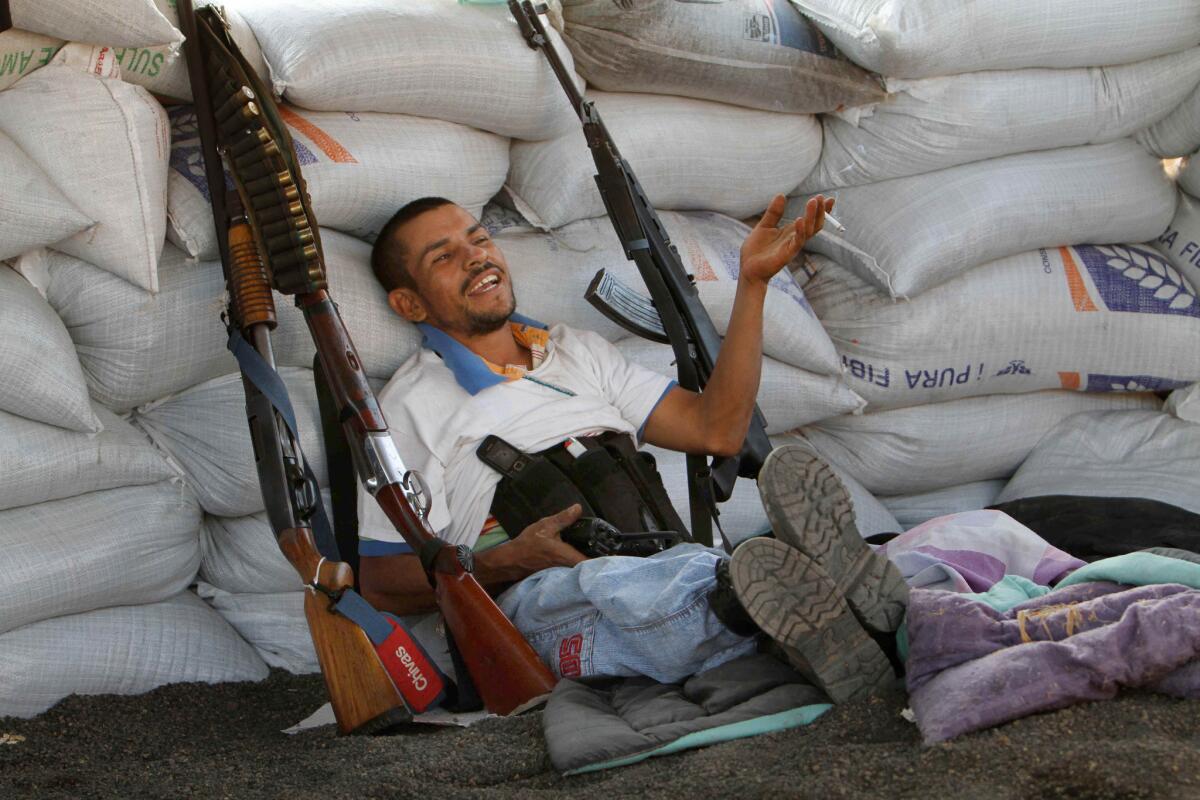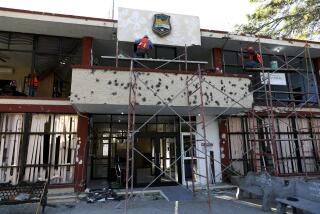Vigilantes to disarm in Mexico’s Michoacan state

MEXICO CITY — The Mexican government has set a date for the so-called self-defense militias in the troubled western state of Michoacan to dissolve and account for their weapons, a move that does not necessarily signal the end of the vigilante movement.
Alfredo Castillo, the administration’s point-man for Michoacan state, said in a series of interviews Tuesday that the militias had agreed to disband by May 10.
Those who want to continue patrolling the towns of Michoacan will have to become part of a new statewide rural police force, Castillo said. All current militia members, however, will be allowed to keep their weapons, regardless of whether they join the police force, as long as they register them with the army and keep them at home, he said.
“Beginning May 11, any [armed] person not registered, not uniformed, will be arrested,” Castillo said.
He said the deadline date would allow authorities to vet and train those who want to join the rural force and to re-train and purge municipal police forces of officers with known or suspected criminal ties.
The vigilante movement in the important agricultural state, which has long been dominated by a fierce drug-and-extortion cartel, has served as one of the most daunting security challenges to the 16-month-old government of President Enrique Peña Nieto.
The armed groups, which began popping up a little more than a year ago, have since spread to several states. But it was in the so-called Tierra Caliente (Hot Land), of Michoacan and neighboring Guerrero where they were most tenacious and came to have great sway, illustrating the government’s inability to protect its beleaguered citizens in those areas.
The militias controlled entry to towns, and many eventually fashioned a kind of uniform of white T-shirts emblazoned with “self-defense,” and drove around in white trucks.
In some places, they were welcomed by residents who for years had been harassed, blackmailed and threatened — and seen some of their neighbors killed — by the Knights Templar, a cartel with quasi-religious, cult-like attributes that has infiltrated or intimidated police forces and city halls across Michoacan.
Analysts noted that the government failed to disarm the movement, which gave them little impediment to taking to the streets again, especially if the somewhat weakened Knights Templar make a comeback. It also remains unclear how the rank-and-file vigilantes will react.
The agreements were reached Monday in meetings in Morelia, the Michoacan capital, between Castillo and 20 leaders who reportedly represent militias in 20 towns. Approval was unanimous, the government said.
Other agreements included the transfer of jailed members of the self-defense movement from distant prisons to one in Michoacan. Those whose only crime was carrying an unauthorized weapon probably will be released, while those accused of additional infractions will move through the normal legal process.
An initial group of 30 detainees was moved Tuesday from a jail in Veracruz, on Mexico’s eastern Gulf Coast, to the Michoacan city of Apatzingan, more than 550 miles away, a federal official told The Times.
Jose Manuel Mireles, a prominent vigilante leader who attended Monday’s meeting, emphasized that his members will keep their weapons. He also contradicted Castillo, saying that registered guns, particularly those belonging to leaders, could be carried in vehicles.
“This is not a disarmament,” Mireles said. “Obviously, although the war may be ending, and they detain all the Knights Templar, we run the risk of a lone hunter, and that is a permanent [threat] as long as we live.”
Mireles acknowledged that they would have to give up military-style weapons such as M-60 machine guns and grenade launchers. But they will be allowed to keep their AK-47 assault rifles and similar equipment, he said.
Mireles also said that Hipolito Mora, the most high-level vigilante under arrest, would soon be released because a murder case against him was falling apart. But the government could not confirm the assertion.
“Let’s also be clear that this deadline is for finishing the cleanup of the state of Michoacan and restoring law and order,” Mireles said. “We will continue with that.”
<runtime:include slug=”la-fg-wn-alsos” />
Twitter: @TracyKWilkinson
Sanchez is a news assistant in The Times’ Mexico City bureau.
More to Read
Start your day right
Sign up for Essential California for news, features and recommendations from the L.A. Times and beyond in your inbox six days a week.
You may occasionally receive promotional content from the Los Angeles Times.







